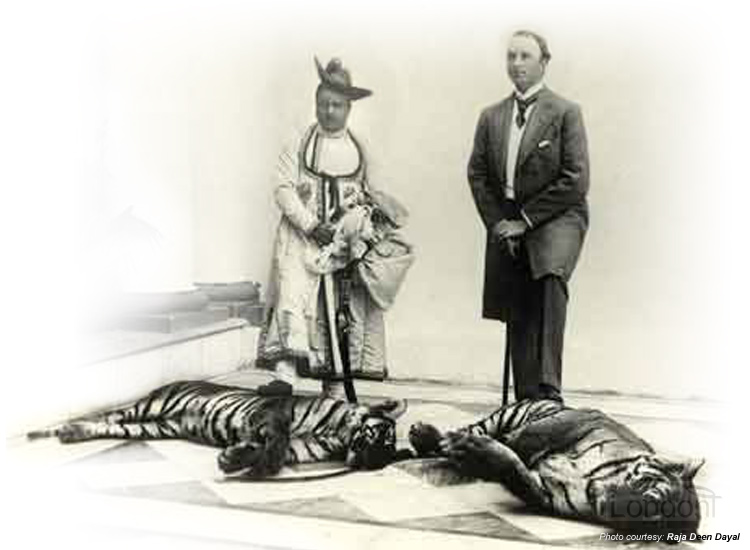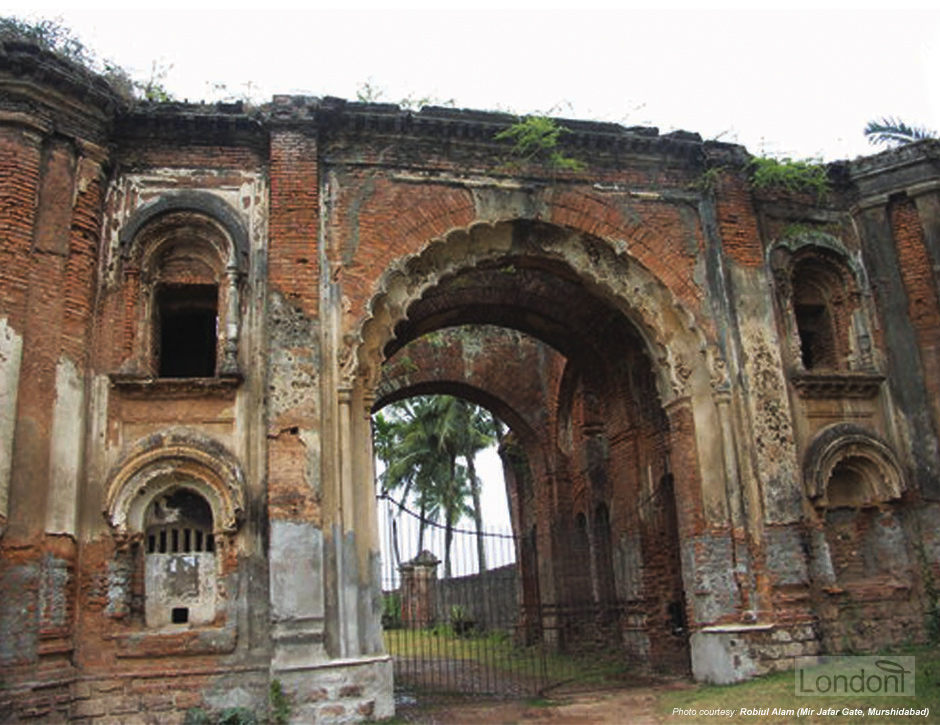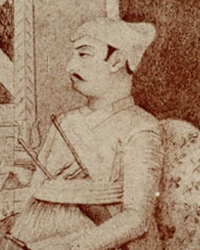Aftermath I

British begin 200 years of dominance thanks to Mir Jafar
According to the treaty drawn between the British and Mir Jafar, the British were granted undisputed right to free trade in Bengal, Bihar and Orissa. It also received the zamindari of the 24 Parganas between Kolkata and the sea, and paid Rs. 17,700,000 (£2.5 million) as compensation for losses caused by Siraj ud-Daulah’s attack on Kolkata and the traders of the city. In addition, Mir Jafar paid large sums as 'gifts' to high officials of the company. Clive himself received more than two million rupees, and William Watts over 1 million.
It was also understood that British merchants and officials would no longer be asked to pay any taxes on their private trade. The company's officials wished to grasp all they could by using Mir Jafar as a 'golden sack' into which they could dip their hands at pleasure.
----------- As a reward the company was granted undisputed right to free trade in Bengal, Bihar and Orissa. http://murshidabad.net/history/history-topic-mir-jafar.htm It also received the Zamindari of the 24 Parganas near Calcutta. Mir Jafar paid a sum of Rs. 17,700,000 http://murshidabad.net/history/history-topic-mir-jafar.htm as compensation to the company for Siraj-ud-Daulla's attack on Calcutta and the traders of the city. In addition, he paid large sums as 'gifts' to high officials of the company. Moreover, it was understood that British merchants and officials would no longer be asked to pay any taxes on their private trade. http://murshidabad.net/history/history-topic-mir-jafar.htm The company's officials wished to grasp all they could by using Mir Jafar as a 'golden sack' into which they could dip their hands at pleasure. -------------copy of the Treaty (the original of which was in Persian) between Clive on behalf of The East India Company and Mir Jafar upon being invested with the Nawabship of Bengal
"I swear by God and the Prophet of God, to abide by the terms of this Treaty whilst I have life." - Mir Mohamed Jafar Khan Bahadur, Servant to King Alamgir.
- Whatever at tides were agreed upon in the time of peace with the Nawab Siraj-ud-Daulla, Mansur-al-Muluk, Shah Kuli Khan Bahadur Hybut Jang. I agree to comply with.
- The enemies of the Enghsh are my enemies, whether they be Indians or Europeans.
- All the effects and factories belonging to the French in the province of Bengal (the Paradise of Nations) and Bihar, and Orissa, shall remain in the possession of the English, nor will I ever allow them any more to settle in the Three Provinces.
- In consideration of the losses which the English Company have sustained by the capture and plunder of Calcutta by the Nawab, and the charges occasioned by the maintenance of the forces, I will give them one crore of rupees.
- For the effects plundered from the English inhabitants at Calcutta, I agree to give fifty lacs of rupees.
- For the effects plundered from the Gentoos, Mussalman, and other subjects of Calcutta, twenty lacs of rupees shall be given.
- For the effects plundered from the Armenian inhabitants of Calcutta, I will give the sum of seven lacs of rupees. The distribution of the sums allotted to the natives, the English inhabitants, Gentoos, and Mussalman, shall be left to the Admiral and Colonel Clive (Sabut Jung Bahadur) and the rest of the Council, to be disposed of by them to whom they think proper.
- Within the ditch which surrounds the borders of Calcutta are tracts of land belonging to several zamindars; besides this. I will grant the English Company six hundred yards without the ditch.
- All the land lying south of Calcutta, as far as Kulpi, shall be under the zamindary of the English Company and all the Officers of those parts shall be under their jurisdiction. The revenues to be paid by them (the Company) in the same manner with other zamindars.
- Whenever I demand the English assistance, I will be at the charge of the maintenance of them.
- I will not erect any new foitifications below Hoogly, near the river Ganges.
- As soon as I am established in the Government of the Three Provinces, the aforesaid sums shall be faithfully paid. Dated 15th Ramzan, in the 4th year of the reign.
- Additional Article - On condition that Mir Jafar Khan Bahadur shall solemnly ratify, confirm by oath, and execute all the above articles, which the under-written on behalf of the Honourable East India Company do, declaring on the Holy Gospels, and before God, that we will assist Mir Jafar Khan Bahadur with all our force, to obtain the subahship of the Provinces of Bengal, Bihar, and Orissa; and further that we will assist him to the utmost against all his enemies whatever, as Soon as he calls upon us for that end; provided that he, on his coming to be Nawab, shall fulfill the aforesaid articles.
The English won the Battle of Plassey more through Mir Jafar’s treachery than through their own bravery. At one time Clive had even wanted to retreat from the battlefield. It has been remarked, therefore, that “Clive won the battle of Plassey in spite of himself”. The results of the battle were, however, far-reaching and momentous, both for England and India. As observed by Malleson, "There never was a battle in which the consequences were so fast, so immediate and so permanent".
British become rich from Bengal tragedy
The post-Plassey period saw a significant outflow of wealth from Bengal. Soon after the battle, Nawab Mir Jafar had to pay to the Company a sum of eight lakh pounds. According to Clive’s estimate, the high officials of the Company also received more than 30 million rupees from him. The revenue of Bengal was invested in East India Company’s trade and the exploitation of this wealth by the Company and its servants continued for years.
------------------ 130 1200-tonnes ship Commanded army of 200,000 troops -------------To engineer a revolution had been revealed as the most paying game in the world. A gold lust unequalled since the hysteria that took hold of the Spaniards of Cortes’ and Pizarro’s age filled the English mind. Bengal in particular was not to know peace again until it had been bled white.
British historians Edward Thompson & G. T. Garrat on English exploitation of Bengal
The Battle of Plassey fastened the shackles of slavery on Bengal and ultimately on the whole of India. The foreign merchants became the masters of the country and emerged as rulers of the subcontinent for the next 200 years - until 1947.
African Slave Trade connection with Bengali cotton, tea and opium
The Company’s reach was beyond India. On the global stage, the underlying thirst for bullion in the East forced a powerful linkage with the growing slave economies of the Atlantic. A terrible triangle was formed with African slaves being purchased in part with Indian cotton goods, then being sold in the Americas for new-mined gold and silver, which in turn found its way via London to India where it procured more textiles. And as tea succeeded Indian textiles as its most profitable product, so the Company sought ways to equally dominate the trade with China. Outright conquest was impossible but the forced export of Bengali opium provided the answer.
Within a few years of Clive’s freak victory over the Nawab of Bengal at Plassey in 1757, the Company had managed to halt the export of bullion eastwards, creating what has poetically been called the “unrequited trade” – using the East’s own resources to pay for exports back to Europe. The impacts of this huge siphoning of wealth were immense, creating a “...misery...” of “...an essentially different and infinitely more intensive kind than all Hindustan had to suffer before...”, in the words of a columnist writing for the New York Tribune in 1853, one Karl Marx.
In the first decades of the nineteenth century, the Company put in place the second strand of its “unrequited trade”, with opium sales in China supporting the entire annual purchase of tea by 1828. The Opium Wars of the early nineteenth century were not, as many might imagine, the result of British attempts to close down this noxious trade but, rather, were driven by the Company’s rage at China’s refusal to accept opium. But all this was a far cry from the Company’s humble and, initially, disastrous beginnings.

Last of the Nawabs
Mir Jafar was the son of Arab immigrant, Sayyed Ahmad Najafi, from the region known as Najaf in modern day Iraq. He come to India as a penniless adventurer like his master Nawab Alivardi Khan, who gave him the hand of his half-sister (Shah Khanam) and raised him to the post of bakhshi, a position next only to the nawab himself.
He was a man always driven by the pursuit of power. During Nawab Alivardi Khan's time Mir Jafar conspired with Ataullah (the faujdar of Rajmahal) to overthrow and murder Alivardi. The conspiracy was unearthed and he was dismissed along with his fellow conspirator. Similarly, after Alivardi's death he urged Siraj's cousin Shawkat Jang to invade Bengal, assuring him of his own support as well as the support of other disgruntled elements in the army and the court of Murshidabad, in dethorning Siraj ud-Daulah. Once again his plans were foiled and he was demoted from his position as bakshi and replaced with the more trustworthy Mir Madan.
There is some question here as to why Mir Jafar was not more severely reprimanded, but its probable that Siraj ud-Daulah was wary of going too far given Mir Jafar's influence and widespread dissatisfaction in his court at that time.
Dissatisfaction with the British but damage already done
After the Battle of Plassey, Clive emerged as the supreme controller of the political destiny of Bengal, though legally he was a subordinate of the governor and Council of Madras. In June 1758, he was elected the governnor by the Calcutta Council, and this election was later approved by the East India Company. Mir Jafar, though theoretically the Nawab of Bengal, found himself entirely dependent on the English, and particularly Clive. The latter interfered in every matter and even prevented Mir Jafar from taking action against his high officials like Rai Durlabh, the diwan, and Ram Narayan, the governor of Bihar. He found his treasury emptied by the impossible financial demands of the East India Company and its officials. These officials treated Mir Jafar "as a golden sack into which they could dip their hands at pleasure".
Soon, however, the Nawab realised that British expectations were boundless and tried to wriggle out from under them, this time with the help of the Dutch at Chinsura. However, Clive found out about this and defeated the Dutch in a battle at Biderra in November 1759.
When Clive returned to England due to ill-health in February 1760, he was rewarded with an Irish peerage, as Lord Clive, Baron of Plassey and also obtained a seat in the English House of Commons.
Son-in-law Mir Qasim takes over
After Clive’s departure, the Company decided to depose Mir Jafar as he had proved unreliable and had failed to make payments due to the Company. The Company sought to replace him by his son-in-law, Mir Kasim, who entered into a secret treaty with the Company on 27 September 1760. Mir Kasim agreed to pay all the outstanding dues of the Company, cede the districts of Burdwan, Midnapore and Chittagong for meeting the military expenditures of the Company, and pay to it five laks of rupees for its war efforts in south India. In October 1760, the Company’s forces surrounded the palace of Mir Jafar in Murshidabad and forced him to abdicate in favour of Mir Kasim. On becoming Nawab, Mir Kasim fulfilled his promises made in the secret treaty and gave the Company’s servants presents worth 29 lakhs of rupees.
 Mir Qasim ()
Mir Qasim ()
However, Mir Qasim proved to be both able and independent, willing to live with but not bow to the British. The Company soon went to war with him in the Battle of Buxar. This was fought on 22 October 1764 between the forces under the command of the British East India Company, and the combined armies of Mir Qasim, Shuja-ud-Daulah (Nawab of Awadh) and Mughal emperor Shah Alam II.
The Nawab and his allies were defeated and he was eventually overthrown. Mir Jafar managed to regain the good graces of the British. He was again appointed Nawab in 1763 and held the position until his death in 1765.
